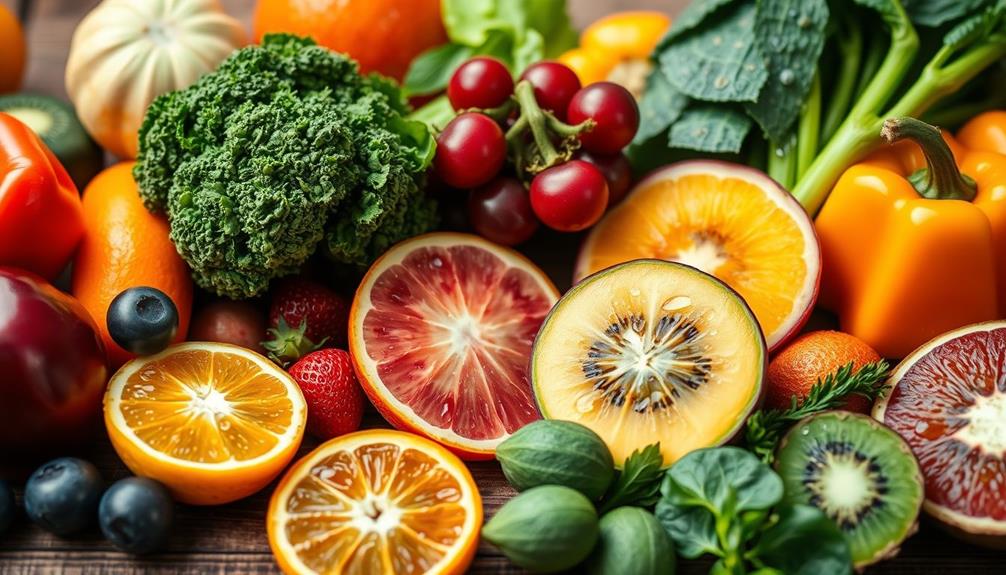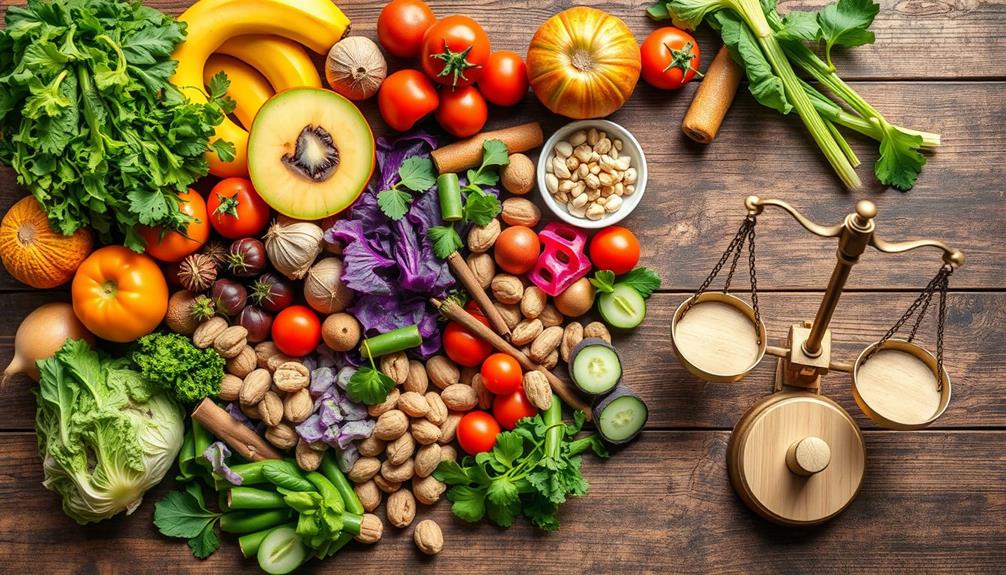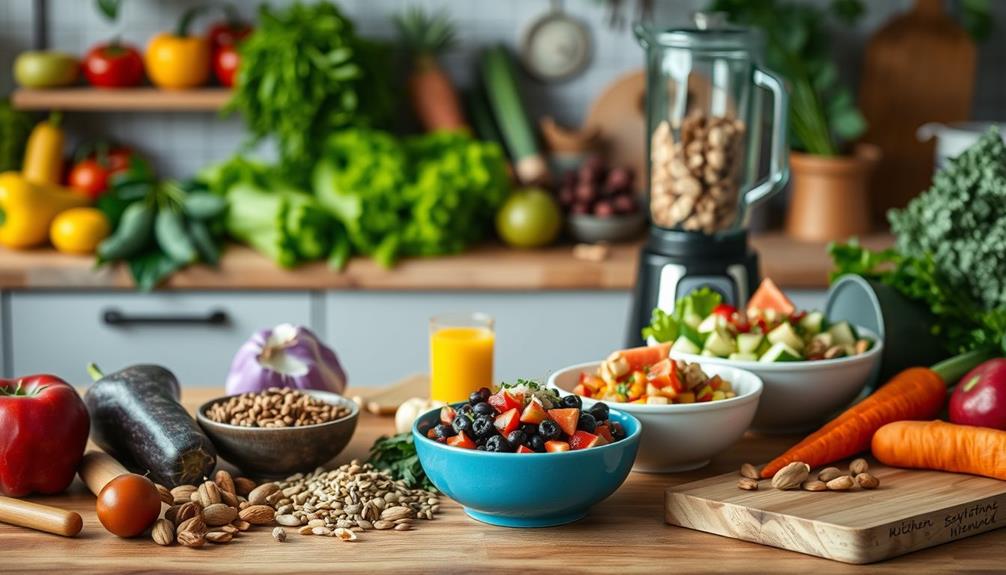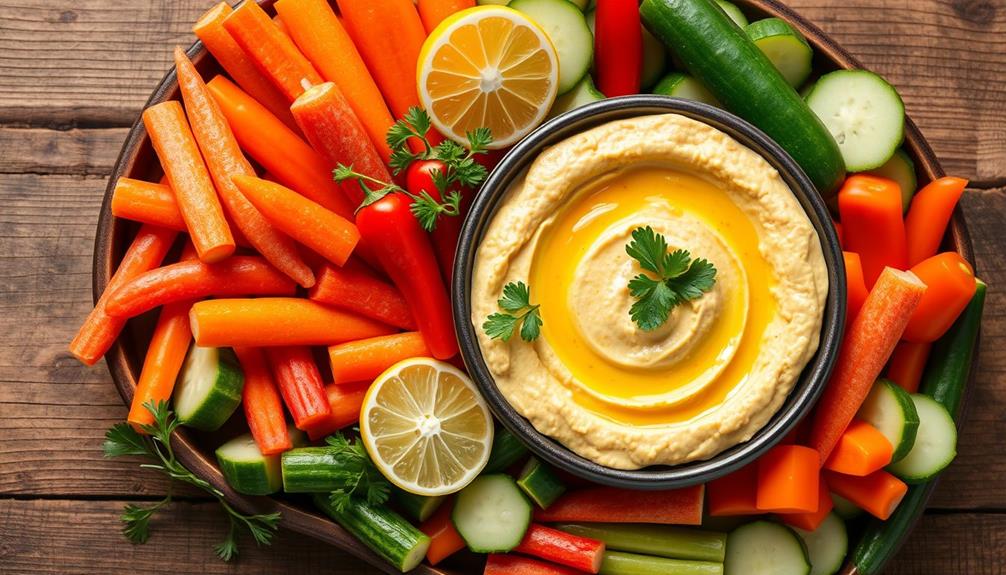A raw food diet emphasizes uncooked, unprocessed plant-based foods, promoting better nutrient absorption and health. You might enjoy benefits like weight loss, increased energy, and improved digestion thanks to high fiber and antioxidants. However, it's essential to be aware of potential drawbacks like nutrient deficiencies, particularly in protein, vitamin B12, and iron. They often come from a limited variety of foods and may lead to digestive issues for some. Meal preparation can be time-consuming too. Understanding the balance of benefits and challenges can help you make informed choices about this lifestyle. There's plenty more to uncover about this unique approach.
Key Takeaways
- The raw food diet emphasizes uncooked, unprocessed foods, aiming to preserve nutrients and enzymes for better health benefits.
- Benefits include increased energy, weight loss, and chronic disease prevention due to high fiber and antioxidant content.
- Nutrient deficiencies, particularly in protein, vitamins, and minerals, can pose risks for those adhering to a strict raw food diet.
- High fiber intake may lead to digestive discomfort, necessitating a gradual introduction of raw foods for sensitive individuals.
- Meal preparation can be time-consuming, and social dining may be challenging due to limited raw food options available.
Overview of Raw Food Diet
The raw food diet is all about embracing nature's bounty in its purest form. This lifestyle focuses on consuming primarily uncooked, unprocessed foods, emphasizing whole plant-based ingredients like fruits, vegetables, nuts, seeds, and sprouted grains.
You won't heat your food above 104-118°F (40-48°C), which helps preserve the natural enzymes and nutrients that are often lost through cooking. Incorporating a raw food diet can enhance nutrient absorption and promote weight loss through the consumption of low-calorie, high-fiber foods, leading to increased energy levels and overall health benefits of raw food.
You can choose from different variations of the raw food diet, such as the raw vegan diet, which excludes all animal products, or the raw vegetarian option that includes raw eggs and dairy. If you prefer a more inclusive approach, the raw omnivorous diet allows for raw animal products.
Food preparation methods in this diet include juicing, blending, soaking, dehydrating, and sprouting, all of which promote a diverse intake of nutrient-dense foods.
Health Benefits of Raw Foods

Eating a raw food diet means you're getting a wealth of nutrients and fiber from fresh fruits and vegetables, which can boost your overall health.
This nutrient density not only supports your digestive system but may also help you shed unwanted pounds.
Additionally, incorporating antioxidant-rich foods like celery juice and beetroots can further enhance your well-being and promote hydration beneficial for overall health.
If you're looking for a way to feel energized and improve your well-being, exploring the benefits of raw foods could be a game-changer.
Nutrient Density and Fiber
A raw food diet showcases an impressive array of nutrient-dense options that can considerably boost your health. By focusing on fresh fruits and vegetables, you increase your intake of essential vitamins and minerals that support overall well-being.
Additionally, many raw foods offer natural remedies that can enhance your health, such as the importance of hydration when consuming high-fiber foods.
Here's how raw foods can enhance your nutrient density and fiber intake:
- High Fiber Content: Raw foods are rich in fiber, promoting digestive health and aiding in weight management.
- Antioxidant Abundance: Fruits and vegetables provide antioxidants that combat oxidative stress, contributing to improved skin health.
- Natural Enzymes: Consuming raw foods preserves natural enzymes, which may enhance nutrient absorption and digestion.
- Chronic Disease Prevention: Increased fiber intake from raw foods has been linked to a reduced risk of chronic diseases, including type 2 diabetes and heart disease.
Incorporating these nutrient-dense raw foods into your diet can lead to numerous health benefits.
You'll not only feel fuller longer but also equip your body with the tools it needs to fight off chronic diseases, all while enjoying the vibrant flavors and textures of fresh produce.
Weight Loss Potential
With its focus on fresh fruits and vegetables, a raw food diet can be an effective strategy for weight loss. This diet is typically low in calories, allowing you to create a calorie deficit while still feeling satisfied.
By increasing your fiber intake through raw foods, you can enhance digestion and regulate appetite, making weight management easier. Additionally, adopting a raw food diet can lead to improved kidney health by emphasizing hydration and nutrient-rich foods, which are essential for ideal kidney function kidney health maintenance.
Studies show that those following a raw food diet may experience body fat reduction and improved metabolic health, including lower blood triglycerides. The high antioxidant content in raw fruits and vegetables can also boost fat oxidation during exercise, leading to more effective weight loss outcomes.
When you consume these nutrient-dense foods, you may notice increased energy levels, which can inspire you to engage in more physical activity—another critical component of weight loss.
Incorporating a raw food diet into your lifestyle not only supports your weight loss goals but also promotes overall health. By focusing on whole, unprocessed foods, you can foster sustainable changes that enhance your well-being and encourage long-term success in maintaining a healthy weight.
Nutritional Risks and Challenges

If you choose a raw food diet, be aware that it might lead to nutrient deficiencies, especially in protein and essential vitamins.
Additionally, the lack of proper meal planning can result in not meeting your savings goals for nutritional investments.
You could also face digestive issues from certain uncooked foods or experience discomfort from high fiber intake.
Plus, meal preparation can become challenging, making it tough to get the nutrients your body needs.
Nutrient Deficiencies Risks
While embracing a raw food diet may seem appealing for its health benefits, it often comes with significant risks of nutrient deficiencies. Many essential nutrients are difficult to obtain from raw foods alone, especially if you're following a raw vegan diet. This is particularly important to take into account, as development influenced by biological factors can impact overall health and growth.
Here are some key nutrients you might lack:
- Vitamin B12: Critical for nerve function and red blood cell production, many raw vegans show low levels of this nutrient.
- Iron: Found in cooked foods, iron absorption can be reduced in raw diets, leading to anemia.
- Calcium: Necessary for bone health, raw food diets may not provide adequate amounts, heightening health risks like lower bone mass.
- Omega-3 Fatty Acids: Important for heart and brain health, these fatty acids are often deficient in raw vegan diets.
Incorporating cooked foods can enhance nutrient absorption, as cooking helps release nutrients like lycopene from tomatoes.
Without careful planning, the long-term adherence to a raw food diet can lead to serious health risks, so it's essential to make sure you're getting all essential nutrients.
Digestive Issues Considerations
Following a raw food diet can lead to several digestive issues that you mightn't anticipate. The high fiber intake from raw fruits and vegetables can cause gas, cramping, and bloating, especially if you have a sensitive gastrointestinal system.
To ease these symptoms, it's wise to gradually introduce raw foods into your diet, allowing your body to adjust without overwhelming it. Additionally, incorporating soothing essential oils like essential oils for digestive relief may help alleviate discomfort associated with these digestive challenges.
Moreover, certain raw foods, like kidney beans and cassava, can be toxic if consumed uncooked. This emphasizes the significance of careful food selection and preparation to avoid harmful effects. You should monitor your digestive responses closely and adjust your choices based on how your body reacts.
It's crucial to keep in mind that a strict raw food diet may lead to nutritional deficiencies. You might find it challenging to get enough protein and vitamin B12, both essential for overall digestive health.
Without these nutrients, you could experience further digestive complications. Balancing your raw food intake while ensuring you meet your nutritional needs is crucial for maintaining a healthy digestive system.
Meal Preparation Challenges
Meal preparation for a raw food diet presents unique challenges that require dedication and careful planning. You'll find that the process can be time-consuming and labor-intensive, leading to potential pitfalls if not managed properly.
Understanding the importance of long-term financial planning for assisted living needs can also highlight the necessity of budgeting for fresh produce and specialty items, which can be more costly than conventional foods.
Here are some key challenges you might face:
- Time Commitment: Soaking, sprouting, and dehydrating foods demand significant time and effort.
- Food Waste: Without proper planning, you risk increased food waste since raw ingredients spoil more quickly than processed options.
- Nutritional Risks: A limited variety of foods can lead to deficiencies in essential nutrients, especially if you're following a vegan version of the diet.
- Unfamiliar Cooking Methods: Learning new preparation techniques can be challenging for those not accustomed to raw food meal prep.
These challenges can complicate both your daily routine and social situations, making it harder to find suitable meals when dining out.
Adjusting to the raw food diet means you'll need to invest time in mastering these preparation techniques to reap the benefits while minimizing risks.
Preparation Techniques and Lifestyle

A raw food diet requires careful preparation techniques to maximize its health benefits and secure safety. You'll need to familiarize yourself with various preparation methods, such as soaking beans and grains to improve digestibility.
Sprouting is another effective technique that enhances nutrient availability, making your meals more nutritious. Additionally, incorporating a variety of safe snacks for hamsters can offer insight into how raw foods can be integrated in a balanced diet.
Juicing and blending raw fruits and vegetables are popular methods for incorporating these foods conveniently, allowing you to increase your nutrient intake easily. However, successful adherence to a raw food diet often demands extensive meal prep planning to guarantee a diverse array of foods, which helps you avoid nutritional deficiencies.
Keep in mind that while many foods can be consumed raw, some cooked foods are necessary for safety—like kidney beans, which need to be cooked to reduce toxicity.
You'll want to be vigilant about food safety, as improper handling can lead to health risks. By mastering these preparation techniques and embracing the lifestyle, you can enjoy the numerous health benefits associated with a raw food diet while keeping your meals safe and satisfying.
Long-Term Adherence Considerations

Maintaining a raw food diet long-term can be challenging due to potential nutrient deficiencies and social limitations. A strict raw food diet can lead to issues like calcium deficiency, impacting your bone health and overall well-being.
Additionally, the restrictive nature of this diet can complicate dining out or social gatherings, where raw options may be limited. It's important to recognize that different dietary approaches can lead to varying levels of nutrition, which is essential for overall health understanding the differences between espresso and coffee.
Here are some key considerations for long-term adherence to a raw food diet:
- Nutrient Availability: Cooking can enhance the bioavailability of certain nutrients, like lycopene in tomatoes, which you may miss out on.
- Balanced Diet: It's vital to guarantee you're getting essential vitamins and minerals that might be lacking in a raw food diet, particularly vitamin B12 and iron.
- Social Interactions: The limited options when dining out can make socializing difficult, impacting your overall enjoyment of food experiences.
- Gradual Approach: Consider incorporating a mix of raw and cooked foods to achieve better nutritional balance and digestive health.
Practical Tips for Beginners

Starting your raw food journey can feel overwhelming, but taking it step by step makes the change smoother. Begin with simple recipes and gradually incorporate more raw foods to help your body adjust to the increased fiber intake. Focus on seasonal produce for better flavor and nutrition, and consider investing in a high-quality blender for efficient meal preparation.
Joining support communities online or locally can provide motivation and recipe sharing during your change. Planning your meals in advance is essential; it guarantees you include a variety of foods to prevent nutritional deficiencies while reducing food waste. Experiment with different preparation methods like soaking, sprouting, and dehydrating to enhance flavors and textures.
Here's a quick reference table to help you get started:
| Tip | Benefit | Suggested Method |
|---|---|---|
| Start Simple | Easier adjustment | Basic salad or smoothie |
| Choose Seasonal Produce | Improved flavor and nutrition | Local farmers' market |
| Invest in Equipment | Efficient meal prep | High-quality blender |
| Join Communities | Support and motivation | Online forums |
| Plan Meals | Variety and reduce waste | Weekly meal prep |
With these change tips, you'll be well on your way to enjoying the raw food diet!
Frequently Asked Questions
What Are the Pros and Cons of the Raw Food Diet?
You'll find that the raw food diet offers benefits like high fiber and antioxidants, boosting energy and skin health. However, it can lead to nutrient deficiencies and increase the risk of foodborne illnesses.
What Are the Benefits of Eating Raw Foods?
Eating raw foods boosts your nutrient intake, enhances digestion, and may improve energy levels. You'll enjoy clearer skin and a lower risk of chronic diseases, all while reducing processed foods and unhealthy additives from your diet.
Why Do People Choose Raw Food Diet?
Why wouldn't you choose a raw food diet? Many people opt for it to boost energy, promote weight loss, and embrace healthier eating habits, all while enjoying fresh, nutrient-rich foods that support overall well-being.
What Are the Negative Effects of Raw Food Diet?
A raw food diet can lead to nutrient deficiencies, digestive issues, and increased foodborne illness risk. You might struggle with long-term adherence, and cooking often enhances nutrient absorption that raw foods might not provide effectively.
Conclusion
In the grand tapestry of nutrition, the raw food diet offers vibrant threads of benefits and challenges. By embracing this culinary adventure, you could reveal a treasure trove of health perks, reminiscent of a garden bursting with life. Yet, like Icarus soaring too close to the sun, be mindful of the risks involved. As you commence on this journey, equip yourself with knowledge, and you'll find a path that nourishes both body and spirit.










